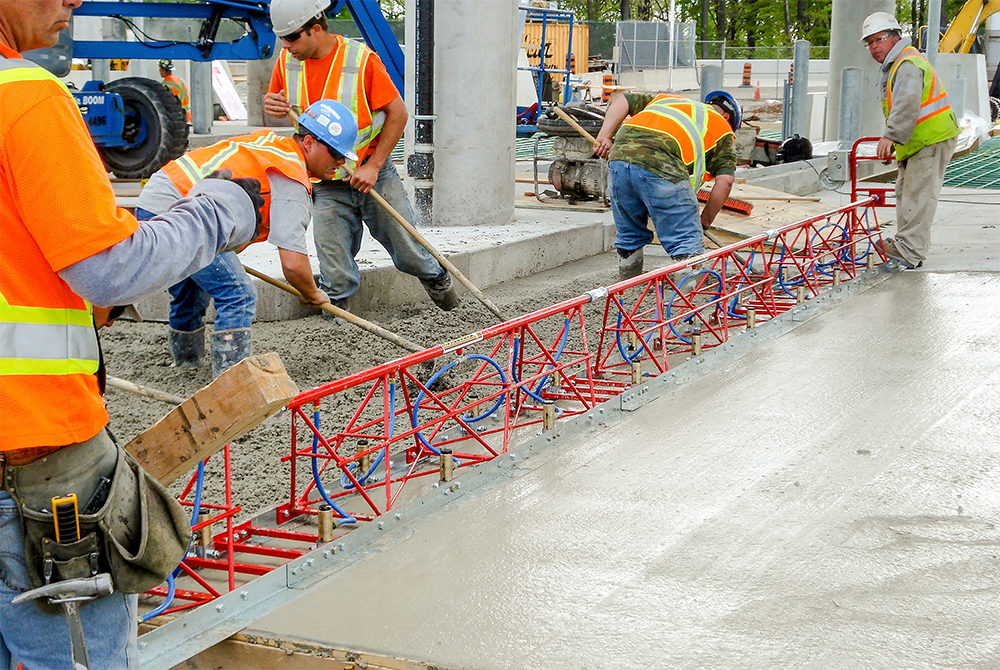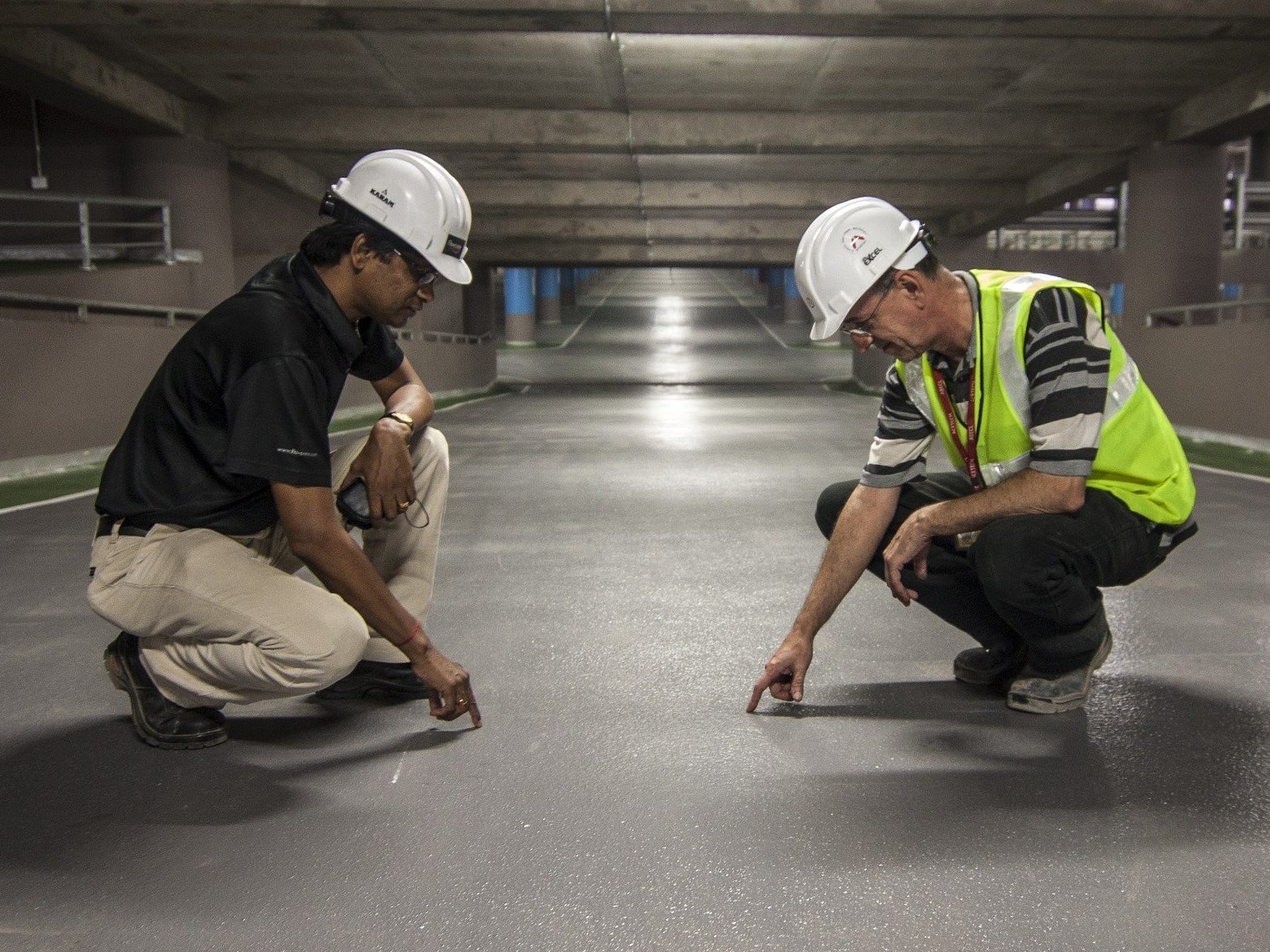West Coast General Engineering concrete foundation: How It Reinforces Large-Scale Industrial Structures
West Coast General Engineering concrete foundation: How It Reinforces Large-Scale Industrial Structures
Blog Article
The Important Role of Concrete Foundation in Structural Honesty and Durability
When it concerns building a building, the structure is a lot more crucial than you may believe. Concrete foundations offer unrivaled strength and longevity, guaranteeing your structure can hold up against numerous environmental difficulties. Without a solid base, you risk prospective problems like moving or breaking, which can compromise safety and value. Recognizing the subtleties of concrete structures might be the trick to maintaining your financial investment for many years to find. So, what should you think about next?
Recognizing the Value of Concrete Foundations
Concrete foundations are important to the overall security of any type of structure, as they provide the essential assistance needed to endure various lots and ecological conditions. When you think of constructing a home or an industrial area, the foundation is the first thing you ought to consider. It works as an obstacle against wetness, shielding your residential or commercial property from water damage. A well-placed concrete structure likewise stops settling and shifting, which can cause cracks in wall surfaces and floors. You'll wish to guarantee that the structure is correctly made and strengthened, as this influences the durability of your structure. Additionally, a strong foundation can improve power effectiveness by lowering air leaks. Bear in mind, overlooking the relevance of a concrete foundation can cause costly repair work down the line. Spending in a quality structure upfront is vital for the honesty and resilience of your framework.
Benefits of Concrete Foundations for Architectural Integrity
While lots of factors add to a structure's structural honesty, concrete foundations use unmatched toughness and strength. You'll appreciate that concrete can withstand severe weather conditions, withstanding both moisture and temperature level variations. This resilience indicates your structure is less likely to experience fracturing or shifting in time, which can jeopardize its safety.Additionally, concrete's intrinsic weight gives a strong base, stopping movement during all-natural events like earthquakes or floodings. When you select a concrete foundation, you're additionally choosing for reduced maintenance; unlike wood, it will not rot or attract parasites, saving you money and time in repairs.Moreover, concrete's fire resistance uses included safety, ensuring your framework can sustain high temperatures without considerable damage. In general, buying a concrete foundation implies you're prioritizing the long-term stability and honesty of your structure, making it a wise selection for any kind of building task.
Typical Types of Concrete Foundations
When it pertains to constructing structures, recognizing the common sorts of concrete structures can assist you make notified choices for your task. One of the most common types consist of slab-on-grade, crawl area, and complete cellar foundations.A slab-on-grade foundation is an easy, affordable option, where a thick concrete piece is put directly on the ground. This type functions well in warm environments, as it lessens heat loss.Crawl room foundations elevate the home somewhat above ground, enabling ventilation and accessibility to plumbing and electric systems. This style can help prevent wetness issues.Full basement foundations supply additional living or storage room while offering excellent architectural support. They need more excavation and are generally made use of in colder environments to avoid frost heave.
Factors to Think About When Creating a Concrete Foundation

Best Practices for Setting Up Concrete Foundations
When you're installing a concrete structure, correct site preparation is important to assure stability (West Coast General Engineering commercial concrete). You'll likewise require to understand reinforcement methods to boost strength and longevity. Do not overlook the curing procedure, as it plays a fundamental function in attaining a solid foundation.
Website Preparation Significance
Although it might seem straightforward, correct website preparation is important for guaranteeing a solid and long lasting concrete foundation. Start by getting rid of the location of any particles, plants, or organic product that might compromise the foundation's honesty. Next, examine the soil type and compaction; you could require to excavate or add materials to develop a secure base. Level the ground to guarantee also weight circulation and stay clear of settling issues later. Mounting correct drain systems is additionally essential to avoid water build-up, which can deteriorate the foundation over time. Ultimately, define the foundation's measurements precisely to assist the pouring process. By adhering to these steps, you'll set the stage for an effective concrete structure that stands the test of time.
Support Techniques Explained
When the site is correctly prepared, the next step in ensuring a sturdy concrete structure includes implementing reliable reinforcement techniques. You need to begin by using steel rebar, which provides tensile toughness and aids stop cracking. Lay the rebar in a grid pattern, making certain it's elevated utilizing spacers to preserve correct protection. Additionally, think about using cord mesh for additional assistance, especially in locations subject to hefty loads. Don't forget to connect the rebar intersections safely with cord. For larger foundations, fiber support can improve toughness, reducing the risk of shrinking splits. Always comply with regional building ordinance and standards to make sure conformity. By applying these reinforcement techniques, you'll considerably improve your structure's stamina and durability, laying a solid groundwork for your structure.
Curing Refine Basics
To assure your concrete structure remedies appropriately, it is necessary to preserve appropriate wetness and modern stamped concrete patio temperature conditions immediately after pouring. Beginning by covering the surface area with a wet burlap or plastic bed linen to preserve wetness. This keeps the concrete hydrated, protecting against fractures and guaranteeing strength. You should additionally keep an eye on the temperature; perfect curing problems are between 50 ° F and 90 ° F. If it's too warm, haze the surface routinely to stop quick evaporation. For cold climate, think about using shielding coverings to maintain heat. Go for a curing duration of a minimum of seven days, as this is essential for ideal stamina development. By following these ideal methods, you'll enhance your foundation's resilience and longevity, making certain architectural stability for many years to find.
Maintenance of Concrete Structures for Long Life
To keep your concrete foundation solid and enduring, routine inspections are essential. You need to likewise guarantee effective water drainage solutions remain in place to protect against water damage. If you identify any fractures, resolving them quickly will conserve you from bigger issues down the line.

Regular Examinations and Analyses
While routine evaluations and assessments might feel like a chore, they're essential for maintaining the honesty of your concrete structure. By regularly checking for splits, changes, or signs of wear, you can capture prospective issues prior to they rise into costly repair work. Look for any kind of water merging around the foundation or unusual settling, as these can signify underlying issues. It's also sensible to check any type of modifications in your home's framework, like doors that stick or windows that don't open efficiently. Keeping a record of your examinations assists track modifications gradually, enabling for aggressive maintenance. Ultimately, these analyses guarantee your structure remains steady, supporting the longevity and safety of your entire framework. Do not ignore this crucial aspect of homeownership!
Reliable Drainage Solutions
Routine inspections can expose concerns like drainage issues that could compromise your concrete structure's security. To avoid water buildup, guarantee your rain gutters and downspouts straight water away from the foundation. Installing French drains pipes can properly redirect surface and groundwater, lowering pressure on your foundation walls. Furthermore, rating the soil around your home assists assure that water moves away, as opposed to pooling near your foundation.Consider making use of sump pumps in locations susceptible to flooding, as they proactively get rid of excess water. Frequently examine for obstructions in drainage systems and clear them quickly. You'll secure your foundation's stability and durability by taking these aggressive actions. Remember, effective water drainage remedies are essential for maintaining a strong, resilient concrete foundation.
Trigger Fracture Repair Works
When you observe fractures in your concrete foundation, addressing them quickly is necessary for preserving its durability. Little fractures can swiftly progress right into this content bigger problems, jeopardizing the structural stability of your home. On a regular basis check your structure for signs of damages, such as horizontal or vertical fractures. If you identify any kind of, do not wait-- repair them right away. You can utilize epoxy injections or concrete patching compounds, which work for securing fractures. Constantly adhere to the supplier's instructions and consider getting in touch with a specialist for considerable damages. Keep in mind, prompt repair work not only boost your structure's durability however likewise conserve you cash in the long run by avoiding a lot more considerable repairs down the line. Stay proactive, and your foundation will certainly continue to be strong and secure.
Addressing Common Concerns With Concrete Structures
Concrete structures can deal with different problems over time, making it critical to recognize and resolve them immediately. One of one of the most usual issues is cracking, which can take place because of temperature fluctuations or clearing up soil. If you notice splits, it's vital to evaluate their dimension and depth; small fractures can typically be secured, while larger ones might require expert evaluation.Water intrusion is an additional major concern. Excess dampness can cause mold development and structural wear and tear. Warranty proper water drainage around your foundation to minimize this danger. Additionally, try to find indicators of moving or bowing wall surfaces, as this can show underlying problems with your structure's stability.Regular inspections are essential to capture these problems early. If you detect any type of concerning signs, do not hesitate to consult a foundation expert. By staying proactive, you can maintain the stability and durability of your concrete foundation, ensuring your home artistic concrete continues to be safe and secure.
Regularly Asked Concerns
Just How Does Soil Kind Affect Concrete Structure Performance?
Dirt kind greatly impacts concrete foundation performance. If you've got large clay, for example, it can cause moving and splitting. Sandy soil may result in working out. Comprehending your dirt helps assure a secure structure.
Can Concrete Foundations Be Repaired if Damaged?
Yes, you can repair broken concrete structures. Depending upon the degree of the damages, strategies like epoxy injection or piece jacking can bring back stability. It's best to speak with an expert for reliable options.
What Is the Common Life-span of a Concrete Structure?
A concrete foundation commonly lasts 30 to 100 years, depending upon aspects like dirt conditions, climate, and upkeep. You'll intend to watch on it to guarantee it continues to be in good shape throughout its life expectancy.
Are There Alternative Products to Concrete for Foundations?
Yes, there are alternatives to concrete for structures, like steel, lumber, and even recycled materials. Each choice has distinct benefits and disadvantages, so you need to consider your task's specific requirements when choosing the right product.
How Does Environment Impact Concrete Foundation Longevity?
Climate greatly affects concrete foundation resilience (West Coast GE Concrete contractors). Extreme temperature levels, dampness, and freeze-thaw cycles can weaken the product, causing cracks and architectural issues. You must consider regional climate conditions when preparing your structure to guarantee lasting efficiency
Report this page